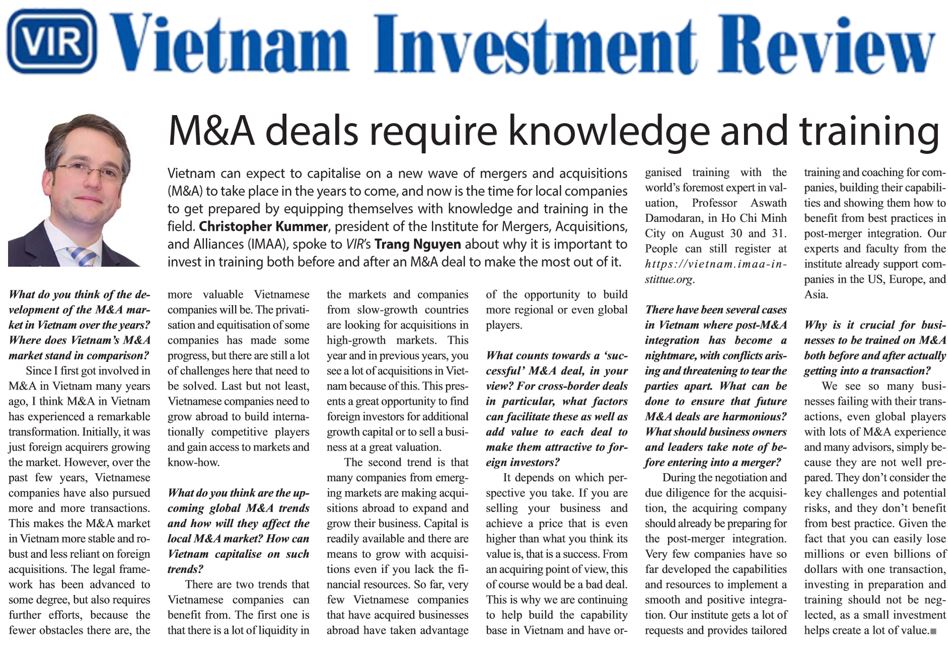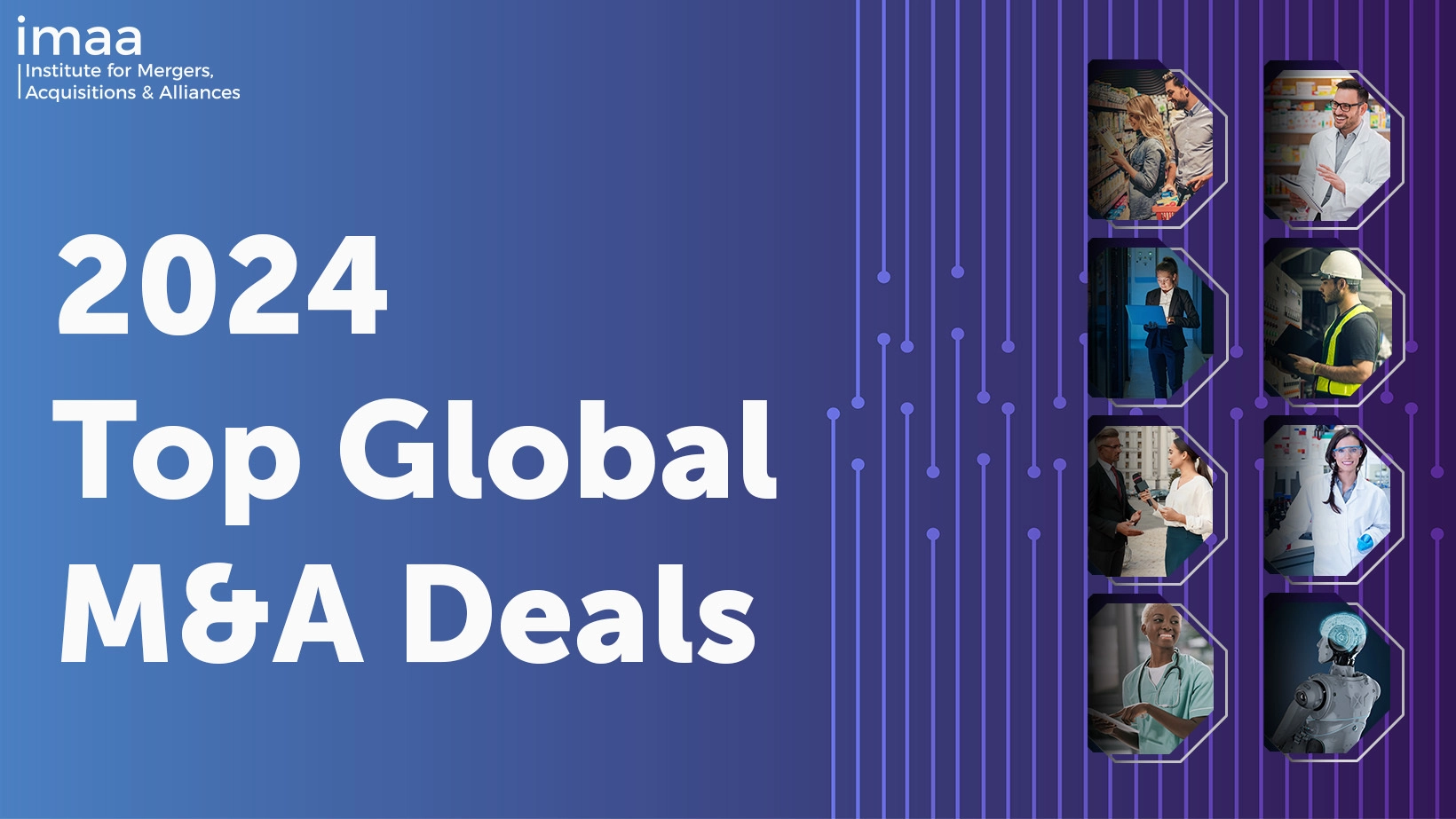Carve-Outs, Spin-Offs, and Divestitures Shaping the Future of M&A
Mergers and acquisitions, a staple in the business world, represent the consolidation of companies or assets, often aiming to achieve growth, enter new markets, or
News News_Kummer M&A deals require knowledge and training

SHARE:
Faculty member mentioned: Prof. Dr. Christopher Kummer
Interview in Vietnam Investment Review
Vietnam can expect to capitalise on a new wave of mergers and acquisitions (M&A) to take place in the years to iew come, and now is the time for local companies to get prepared by equipping themselves with knowledge and training in the field. Christopher Kummer, president of the Institute for Mergers, Acquisitions, and Alliances (IMAA), spoke to VIR’s Trang Nguyen about why it is important to invest in training both before and after an M&A deal to make the most out of it.
What do you think of the development of the M&A market in Vietnam over the years? Where does Vietnam’s M&A market stand in comparison?
Since I first got involved in M&A in Vietnam many years ago, I think M&A in Vietnam has experienced a remarkable transformation. Initially, it was just foreign acquirers growing the market. However, over the past few years, Vietnamese companies have also pursued more and more transactions. This makes the M&A market in Vietnam more stable and robust and less reliant on foreign acquisitions. The legal framework has been advanced to some degree, but also requires further efforts, because the fewer obstacles there are, the more valuable Vietnamese companies will be. The privatisation and equitisation of some companies has made some progress, but there are still a lot of challenges here that need to be solved. Last but not least, Vietnamese companies need to grow abroad to build internationally competitive players and gain access to markets and know-how.
What do you think are the upcoming global M&A trends and how will they affect the local M&A market? How can Vietnam capitalise on such trends?
There are two trends that Vietnamese companies can benefit from. The first one is that there is a lot of liquidity in the markets and companies from slow-growth countries are looking for acquisitions in high-growth markets. This year and in previous years, you see a lot of acquisitions in Vietnam because of this. This presents a great opportunity to find foreign investors for additional growth capital or to sell a business at a great valuation. The second trend is that many companies from emerging markets are making acquisitions abroad to expand and grow their business. Capital is readily available and there are means to grow with acquisitions even if you lack the financial resources. So far, very few Vietnamese companies that have acquired businesses abroad have taken advantage of the opportunity to build more regional or even global players.
What counts towards a ‘successful’ M&A deal, in your view? For cross-border deals in particular, what factors can facilitate these as well as add value to each deal to make them attractive to foreign investors?
It depends on which perspective you take. If you are selling your business and achieve a price that is even higher than what you think its value is, that is a success. From an acquiring point of view, this of course would be a bad deal. This is why we are continuing to help build the capability base in Vietnam and have or
ganised training with the world’s foremost expert in valuation, Professor Aswath Damodaran, in Ho Chi Minh City on August 30 and 31. People can still register at https://vietnam.imaa-instittue.org.
There have been several cases in Vietnam where post-M&A integration has become a nightmare, with conflicts arising and threatening to tear the parties apart. What can be done to ensure that future M&A deals are harmonious? What should business owners and leaders take note of before entering into a merger?
During the negotiation and due diligence for the acquisition, the acquiring company should already be preparing for the post-merger integration. Very few companies have so far developed the capabilities and resources to implement a smooth and positive integration. Our institute gets a lot of requests and provides tailored
training and coaching for companies, building their capabilities and showing them how to benefit from best practices in post-merger integration. Our experts and faculty from the institute already support companies in the US, Europe, and Asia.
Why is it crucial for businesses to be trained on M&A both before and after actually getting into a transaction?
We see so many businesses failing with their transactions, even global players with lots of M&A experience and many advisors, simply because they are not well prepared. They don’t consider the key challenges and potential risks, and they don’t benefit from best practice. Given the fact that you can easily lose millions or even billions of dollars with one transaction, investing in preparation and training should not be neglected, as a small investment helps create a lot of value.
Published: August 13, 2018
Related IMAA in the news:
Related information:
Mergers and acquisitions, a staple in the business world, represent the consolidation of companies or assets, often aiming to achieve growth, enter new markets, or

IMAA’s 2024 Top Global M&A Deals industry coverage offers an overview of the year’s most significant M&A transactions across eight key industries. This monthly M&A

Explore the transformative journey that mergers and acquisitions activity is bringing to the sports industry. The Institute for Mergers, Acquisitions, and Alliances (IMAA) dataset on
Stay up to date with IMAA Institute company news
Trainings
© Institute for Mergers, Acquisitions and Alliances
In order to become a charterholder you need to complete one of the IMAA programs